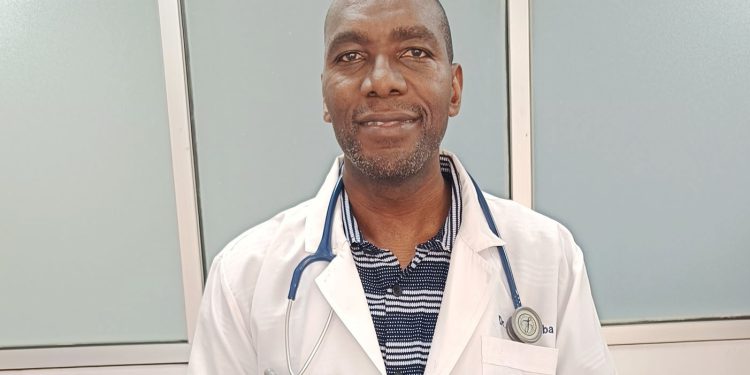Dr. Robert Kalyesubula, a nephrologist hailing from Uganda, has received the esteemed Fellowship of the Royal College of Physicians (FRCP) in London.
This distinguished honor was presented to him in September 2024 at the Royal College of Physicians in London.
The FRCP award represents not only his significant professional achievements but also the extraordinary path he has navigated throughout his life.
Kalyesubula is the founder of the Uganda Kidney Foundation and currently holds the position of senior lecturer, consultant nephrologist, and kidney researcher at Nakasero Hospital in Kampala.
His unwavering determination has inspired many individuals across Uganda.
He noted that the fellowship represents the commitment of physicians who truly prioritize their patients and work diligently to enhance lives. He attributes his achievements to the steadfast support of his family, particularly his wife, Estherloy Katali Kalyesubula, with whom he shares three children.
He expressed profound gratitude to God and to all who had faith in him.
Pioneering Nephrology in Uganda
Kalyesubula’s dedication to research has been fundamental to his achievements.
With more than 136 peer-reviewed publications in the fields of hypertension, nephrology, and global health, his contributions have greatly enhanced the comprehension of kidney function in Sub-Saharan Africa.
“I have an H-index of 30, which ranks me highly among researchers worldwide. My research published in Lancet Global Health in 2022 focused on measuring kidney function in our communities,” he noted.
Kalyesubula elaborated on his H-index of 30, indicating that his 30 published research works have been cited by various medical and scientific researchers.
He takes pride in his significant contributions at Mulago National Referral Hospital, highlighting his influence in advancing nephrology practices in Uganda and throughout Africa.
Kalyesubula noted that he played a key role in expanding the availability of dialysis machines in Uganda, growing the count from a mere five to more than 200 by 2012, which enabled a significantly larger number of patients to access essential life-saving treatment.
In addition, he was instrumental in the first kidney transplant conducted in Uganda in 2023, highlighting the necessity of training new nephrologists to support their communities.
Among the 70 physicians awarded fellowships from the FRCP this year, Kalyesubula stands out as the sole nephrologist from Uganda.
Only three physicians from Africa received awards.
Of the 70 physicians, 40 fellows are from London, while 30 come from other parts of the world.
He explained that it is a rigorous selection process where professionals from various countries review your work and put forth your name for evaluation by a distinguished panel of doctors who are already esteemed fellows of the FRCP.
The team assesses one’s impact on medical research, clinical practice, education, and global contributions.
For Kalyesubula, this distinction is not just a personal milestone; it also inspires optimism within Uganda’s medical community.
He emphasized that this acknowledgment enhances the nation’s standing internationally, showcasing that “we possess skilled and competent medical professionals.”
He said it also paves the way for collaborative efforts and training opportunities.
Only 15 nephrologists in Uganda
Uganda has only 15 nephrologists available to cater to a population of 45.9 million people.
The shortage highlights the vulnerability of individuals to kidney infections, as anyone can potentially be affected.
According to Kalyesubula, the country lacks the necessary resources to train nephrologists locally, leading to a reliance on training programs abroad.
Physicians in Uganda often compete for scholarships to study nephrology in countries like Egypt, South Africa, Nigeria, Kenya, India, the USA, the UK, and Canada.
Globally, kidney disease affects approximately 1 in 10 individuals, which translates to about 10% in Africa.
In Sub-Saharan Africa, the prevalence rises to around 13.6%, equating to roughly 1 in 8 people in Uganda.
Research conducted by the Uganda Kidney Foundation (UKF) in 2024 indicates that the percentage of individuals with advanced kidney disease, defined by a Glomerular Filtration Rate (GFR) of less than 60%, ranges from 2% to 13%.
Kidney disease rates differ significantly throughout Uganda, with the Eastern region experiencing the highest prevalence at 13%, indicating that 1 in every 8 individuals is impacted. The Central region follows with approximately 7%, or 1 in 12 people affected, while the Western region reports a lower rate of 3.9%, translating to about 1 in 20 individuals.
Kalyesubula warns that individuals with diabetes or HIV face an increased risk of developing kidney disease, with the likelihood rising to 1 in 7 for those with HIV, where the prevalence is at 15%.
In 2004, Kalyesubula was awarded a highly competitive Fogarty NIH scholarship to pursue my master’s degree.
During this period, he met Professor Majid Sadigh, an exceptional physician from Yale School of Medicine, who would later play a pivotal role in his career.
“He made me read six medical journals every week, in addition to handling the most complex cases at Mulago Hospital. There were days when I felt completely overwhelmed, but looking back, I realize how much I grew during that time. Majid challenged me to think critically, to question everything, and to push beyond what I thought were my limits,” Kalyesubula recalls.
He said later Majid connected him with one of his colleagues, Professor Asghar Rastegar, a distinguished nephrologist.
He said the introduction significantly altered the trajectory of his life once more.
With Asghar’s guidance, along with the steadfast support of his Ugandan mentor, Dr. Emmanuel Sekasanvu, he applied for and received an International Society of Nephrology Fellowship, which enabled him to study nephrology at Yale School of Medicine.
After completing his fellowship, he returned to Mulago Hospital, eager to apply his newly acquired skills.
Striving to secure a job
Kalyesubula noted that despite his qualifications, he endured six unsuccessful job interviews.
He decided to dedicate four years to volunteering, uncertain if he would ever find a role where he could make a meaningful impact.
“Those were difficult years, filled with uncertainty. But through it all, I remained determined. Finally, after years of persistence, I secured a position at Makerere University College of Health Sciences School of Medicine, where I now head the department of Physiology and continue my work in nephrology,” he noted.
In 2017, he was presented with another significant opportunity: the GSK OpenLab and MRC/UVRI and LSHTM Uganda Research Unit scholarship, which allowed him to pursue a PhD at the esteemed London School of Hygiene and Tropical Medicine.
He stressed that his experience in London was a dynamic blend of learning, collaboration, and exploration.
He engaged in public health initiatives alongside esteemed professors such as Laurie Tomlinson, Liam Smeeth, and Gavin Dreyer, whom he said challenged him to deepen his understanding of global health issues.
Kalyesubula’s exceptional contributions have led to his appointment as an adjunct assistant and associate professor at Yale University School of Medicine, the University of Vermont in the USA, McMaster University in Canada, and Charité University in Germany.
The influence of Kalyesubula’s work is clearly reflected in the moving narratives of his patients.
Mark Ssali conveyed his appreciation, stating, “Kalyesubula is truly committed to his profession and rightfully deserves this recognition. He diagnosed my kidney failure and recommended dialysis, which was life-saving. When my situation deteriorated, he arranged for my kidney transplant in Nairobi. I am now back to work, all thanks to his dedicated care.”
Juliet Kabalungi shared similar thoughts: “Kalyesubula supported me throughout my kidney transplant experience with remarkable care and empathy. He diagnosed me with end-stage kidney failure and offered hope when I felt hopeless. With his steadfast support, I successfully underwent a kidney transplant and am now flourishing.”
Their experiences highlight the profound truth that every medical success is rooted in a genuine dedication to patient care and connection.
Prof. Pauline Byakika, the head of the Department of Medicine at Makerere University College of Health Sciences, commended Kalyesubula for his commitment, stating, “He is diligent and insightful, guiding numerous individuals with a genuine enthusiasm for his profession.”
Dr. Grace Kansiime, a nephrologist at Mbarara University, remarked, “Kalyesubula is more than a colleague; he is a friend and mentor who motivated me to pursue a career in nephrology. He is truly worthy of this fellowship.”
Who is Kalyesubula?
Hailing from Nakaseke village, his life took a devastating turn at the age of six when the Luwero war resulted in the loss of his father, and his mother vanished for eight years.
Suddenly, he found himself responsible for his three siblings, confronting several challenges.
He was forced to leave school to provide for them.
A Canadian named Barnett Ray became aware of their situation and assisted Kalyesubula and his siblings in finding refuge at the African Children’s Choir orphanage, marking a pivotal moment in his life.
He narrated that with the orphanage’s support, he was able to finish his education and received a government scholarship to Makerere University.
He said becoming a doctor was a dream that once felt out of reach, but through determination and support, it became possible.
Today, Kalyesubula is dedicated to giving back to his community.
After completing his education, he returned to Nakaseke Hospital, where he encountered many orphans enduring similar struggles.
This experience motivated him to create the African Community Center for Social Sustainability (ACCESS-Uganda), which currently aids 478 orphans by providing education, healthcare, and hope for a better future.
“When I meet these children, I see reflections of my past, and I am reminded of the importance of helping those in need,” he concluded, embodying a spirit of resilience and compassion.


